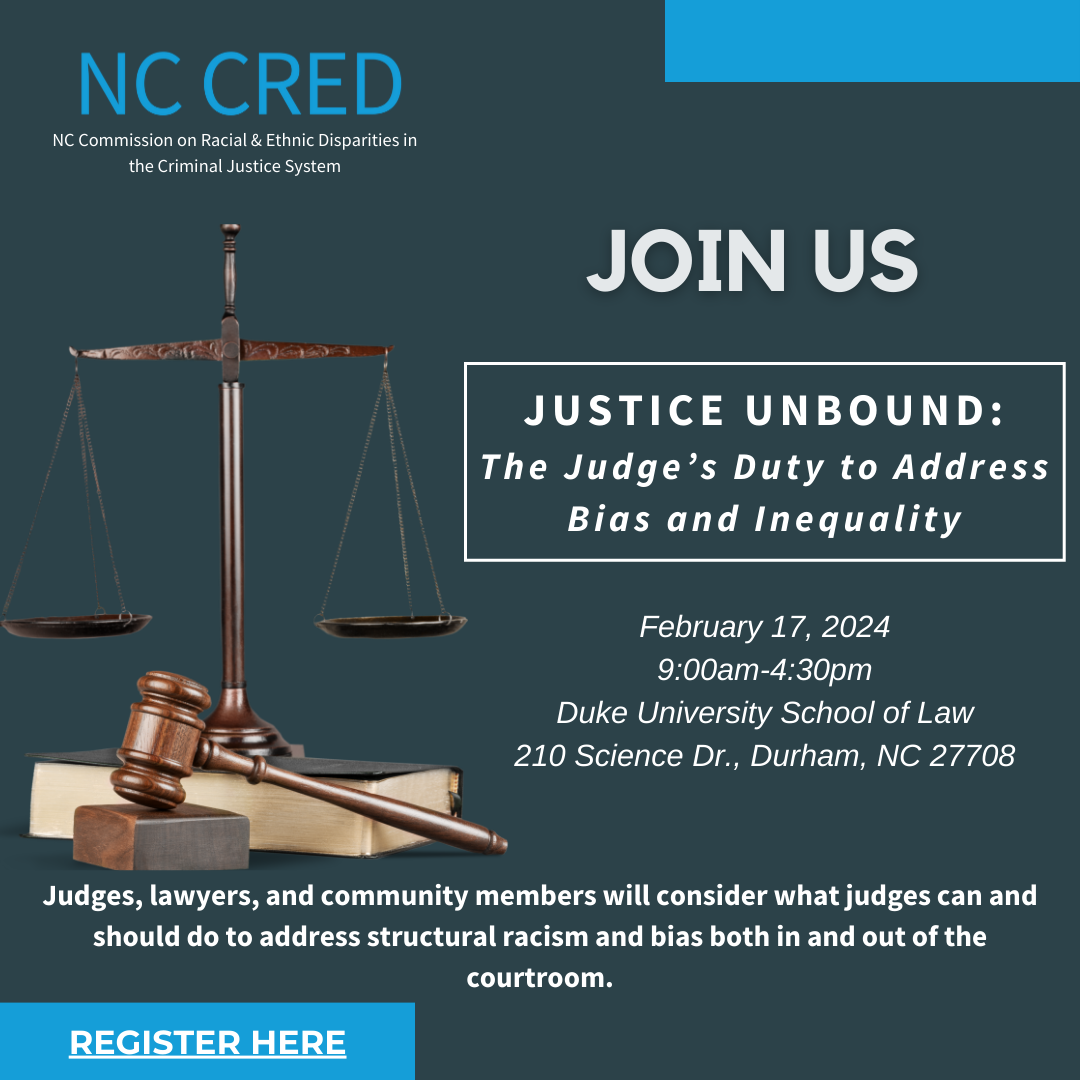NC CREDNorth Carolina Commission onRacial & Ethnic Disparitiesin the Criminal Justice System
North Carolina Commission on Racial & Ethnic Disparities in the Criminal Justice System

- This event has passed.
Justice Unbound: The Judge’s Duty to Address Bias and Inequality
February 17, 2024 @ 9:00 AM – 4:30 PM EST

For the full program, speaker information, and day-of reminders, please visit the Justice Unbound Website!
Over the last few decades, community members, lawyers, researchers, and government actors have built a powerful movement to address the long history of racialized outcomes and excessive punishment in the criminal legal system. But is there a role for judges in such a movement and, if so, what should it be? The sponsors of this Symposium believe not only that judges have a role, but that they are indispensable in any meaningful effort to unwind racialized mass incarceration.
Judges are often hesitant to speak publicly about systemic issues in the court system, to avoid the appearance of partiality. However, as leading jurists including Chief Justice Beasley recognized in 2020, canons of judicial ethics do not prevent judges from speaking out about injustice or working to improve the fairness of our legal system. To the contrary, they impose an ethical responsibility on judges to build public trust by listening to community concerns and ensuring that bias does not taint experiences and outcomes in the legal system. Chief Justice Martin recognized as much in 2017 when his Commission on the Administration of Law and Justice recommended eliminating actual and perceived bias in the courts.
In this symposium, judges, lawyers, and community members will consider what judges can and should do to address structural racism and bias both in and out of the courtroom. We will hear from speakers on topics including the criminalization of poverty and racial discrimination in jury selection. Sessions will address both racial equity in legal doctrine and collaborative efforts to build an inclusive culture in the legal system. Speakers will share insights into navigating ethical obligations and facing the backlash against racial equity initiatives. Judges will discuss diversity in the legal profession and share practical tools for guarding against the influence of bias. To prioritize the attendance of North Carolina judges, 50 spots are reserved for registration.
Continuing Legal Education (CLE) is available for this event. Any North Carolina attorney attending will receive 5.25 hour(s) of CLE credit, of which 0 hour(s) * will be available to satisfy the substance abuse/mental health awareness requirement, 1.75 hour(s) will be available to satisfy the professional responsibility/ethics requirement, and 0 hour(s) will be available to satisfy the technology requirement.
Faculty include:
- Alison Ashe-Card, Duke Law Associate Dean for Diversity, Equity, and Inclusion
- Angie Weis Gammell, Policy Director, Wilson Center for Science and Justice
- Annie Hudson-Price, Senior Counsel, Office for Access to Justice, US Dept. of Justice
- Senior Associate Justice Anita Earls, Supreme Court of North Carolina
- Caitlin Fenhagen, Orange County Criminal Justice Resource Director
- Chief District Court Judge Elizabeth Trosch
- Chief District Court Judge Regina Parker
- Dean Patricia Timmons-Goodson, NCCU Law
- Derrik Anderson, Executive Director, Race Matters for Juvenile Justice
- Former District Court Judge Brooke Locklear Samson
- District Court Judge Kendra Montgomery-Blinn
- Edwin T. Bell, Director of Racial Justice, Equity, and Inclusion, National Center for State Courts
- Emily Coward, Director, Duke Law Inclusive Juries Project
- Former North Carolina Chief Justice Cheri Beasley
- James E. Williams Jr., Board Chair, NC CRED
- Judge Donovan Foughty, President, National Consortium on Racial and Ethnic Fairness in the Courts
- Judge Gayl Branum Carr, National Council of Juvenile and Family Court Judges (NCJFCJ) President
- Retired Cumberland County Superior Court Judge Gregory Weeks
- Judge James Wynn, Fourth Circuit Court of Appeals
- Judge Nancy Gertner (Ret.), Senior Lecturer, Harvard Law School
- Judge Susan Maven, New Jersey Superior Court
- Justice Carla Wong McMillan, Georgia Supreme Court
- Mecklenburg County Clerk of Superior Court and Judge of Probate Elisa Chinn-Gary
- New Mexico Chief Justice Shannon Bacon
- North Carolina Solicitor General Ryan Park
- North Carolina Supreme Court Justice Robin Hudson (ret.)
- Professor James E. Coleman, Jr., Duke University School of Law
- Professor Nina Chernoff, CUNY Law
- Professor Thomas Ward Frampton, University of Virginia School of Law
- Superior Court Judge Lou Trosch
- Tom Ross, National Center for State Courts (NCSC) Board of Directors and former Director of NC Administrative Office of the Courts
- Tonnya Kennedy Kohn, South Carolina State Court Administrator
Sponsors and Partnering Organizations include:
- Conrad, Trosch, and Kemmy, P. A.
- Duke Energy Foundation
- Duke University School of Law Inclusive Juries Project
- Duke University School of Law Wilson Center for Science and Justice
- Fialko Law PLLC
- Frazier and Griffin Law Firm
- Johnson and Groninger
- Judge Donovan Foughty
- Ken Lewis
- Mills and Mahoney, P.A.
- National Consortium on Racial and Ethnic Fairness in the Courts
- National Council of Juvenile and Family Court Judges (NCJFCJ)
- North Carolina Advocates for Justice
- North Carolina Association of Black Lawyers
- NC Bar Association (NCBA)
- Race Matters for Juvenile Justice
- The Governor’s Task Force for Racial Equity in Criminal Justice
- The Law Office of Bartina Edwards, PLLC
- Tin, Fulton, Walker & Owen